Blogs
A broker platform providing new innovative experiences in stock trading: SAS(Stock Analysis Software)

Sourcecode Pvt. Ltd has recently launched an app called ‘Stock Analysis Software’. This will supposedly change the trading experience for the users.
They claim to have advanced tools that will provide essential insights to the users while maintaining unmatched international standards in financial technology. “The remarkable response we have received since the launch of this software reaffirms our commitment to innovation and excellence in the Nepalese finance sector.
We are proud to bring world-class technology to our market, empower investors and brokers with state-of-the-art technology, help customers track their stock portfolios, and broker transactions, and get stock market information in real-time through the same platform.”, says the CEO of Sourcecode, Amod Bhattarai.
This software allows the customers to get access to their information on transactions and also the service provided by the broker to the customer. The software will also provide customers with a range of functions that enhance efficiency and transparency in transactions with brokers., from providing real-time updates of customer portfolio after-sale to streamlining account opening processes with three-in-one KYC processes, which includes video authentication.
The company claims that it can also provide timely information about stock price fluctuations, portfolio updates, and new investment opportunities. This will allow the users to make the right decisions in time, while the stock screener who can adapt to them will also show business strategies to achieve individual preferences and goals.
Similarly, brokers have access to customer risk profiles based on transaction history, which helps in personalized service and decision-making, the company said.
You may also like:
Blogs
Birgunj Customs Office Collects Highest Revenue from Petroleum Imports

The Birgunj Customs Office has collected the highest revenue from the import of petroleum products in the first 11 months of the current fiscal year 2081/82. According to the office, a total of NPR 73.18 billion was collected in revenue from petroleum imports alone.
During this period, Nepal spent about NPR 174.09 billion to import five different types of petroleum products. These petroleum imports contributed 46.43% of the total revenue collected from the top 20 imported items, making it the most important source of income for the customs office.
Major Revenue Contributors from Imports

What Officials Say
Customs Chief Administrator Deepak Lamichhane stated that petroleum products and vehicle imports are the main sources of customs revenue at Birgunj. He highlighted that these two sectors consistently contribute the highest share of government income collected through imports.
Conclusion
The data from the Birgunj Customs Office shows that fuel and vehicles remain Nepal’s most heavily imported and taxed items. With more than 46% of the revenue coming from petroleum alone, any changes in fuel prices or import volumes can significantly affect national customs revenue.
AGM
NMB Laghubitta to Hold 12th Annual General Meeting on July 16
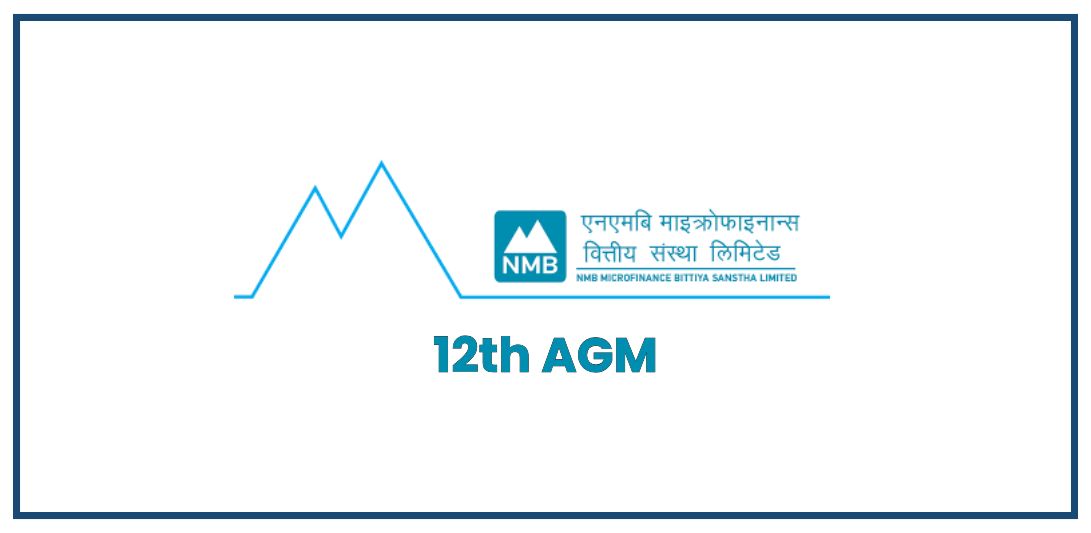
NMB Laghubitta Bittiya Sanstha Ltd., a licensed “D” class microfinance institution by Nepal Rastra Bank, has announced its 12th Annual General Meeting (AGM). The AGM will discuss financial performance, proposed amendments, and other key matters.
Key Details of the AGM
| Topic | Details |
|---|---|
| AGM Number | 12th Annual General Meeting |
| Date | Asar 32, 2082 (Wednesday, July 16, 2025) |
| Time | 9:00 AM |
| Venue | Hotel City Square Pvt. Ltd., Pokhara-8, New Road, Kaski |
| Book Closure Date | Asar 24, 2082 (July 8, 2025) |
| Eligibility Cut-off | Shareholders registered till Asar 23 are eligible |
| Share Registrar | NMB Capital Ltd., Baluwatar, Kathmandu |
| Official Website | www.nmbmicrofinance.com |
Agenda of the AGM
A. General Proposals
-
Discussion and approval of the Chairman’s Annual Report for FY 2080/81.
-
Approval of financial statements, including balance sheet, profit & loss, and cash flow for FY 2080/81.
-
Appointment of an auditor for FY 2081/82 and determination of their remuneration.
B. Special Proposals
-
Amendments in MoA/Bylaws regarding:
-
Promoter and public shareholding ratio to be set at 51% and 49% respectively.
-
Number of directors representing promoter shareholders.
-
-
Changes in board formation, number of members, and tenure.
-
Authorization to initiate a merger/acquisition with other “D” class microfinance institutions.
-
Authorization to make further amendments based on regulatory directives from Nepal Rastra Bank.
C. Miscellaneous
-
Discussion of any shareholder queries.
-
Clarifications will be provided by the Chairman or an authorized person.
Important Instructions for Shareholders
-
Share registration will be closed on Asar 24 for AGM purposes.
-
To attend the AGM, shareholders must carry:
-
Entry pass (attached to the annual report)
-
Share certificate or Beneficiary (BO) Account proof
-
Valid ID with photo
-
-
Shareholders must sign the attendance book at the venue starting from 8:00 AM.
-
Shareholders may appoint a proxy representative; however, the proxy form must be submitted at least 48 hours before the meeting.
-
Minor or mentally disabled shareholders must be represented by their registered guardians.
-
No bags or restricted items will be allowed inside the AGM venue.
-
Any shareholder inquiries must be submitted in writing at least 7 days in advance to the registered office.
Notice: NMB Laghubitta 12th Annual General Meeting (AGM)
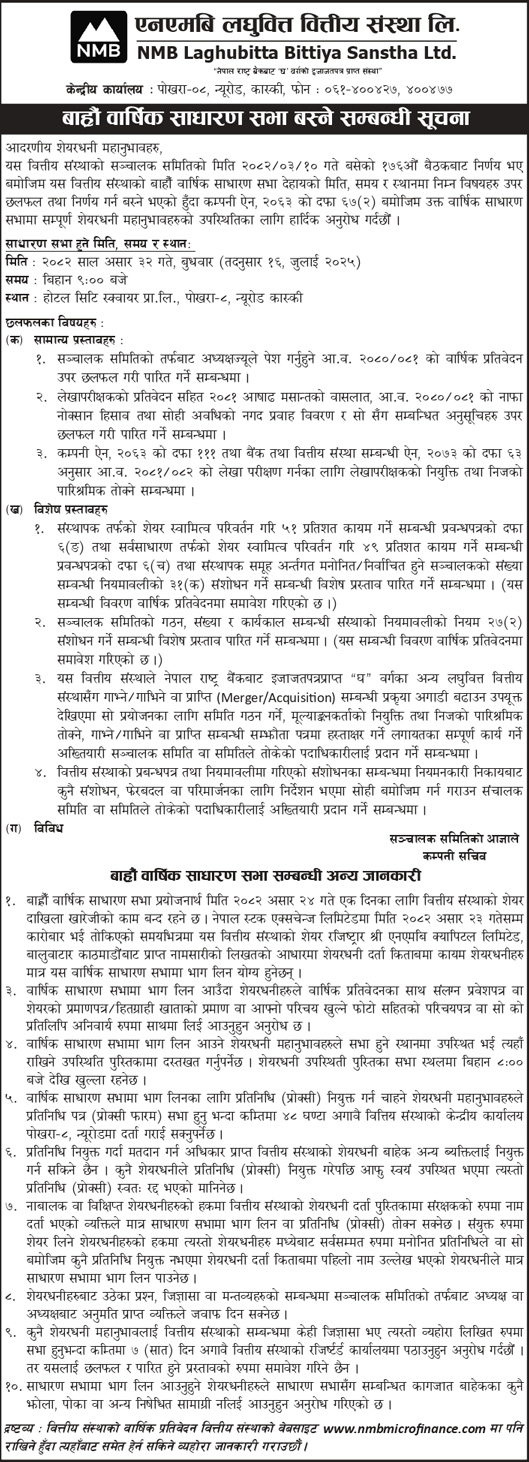
Blogs
Private Power Producers Protest ‘Take and Pay’ Provision in Budget
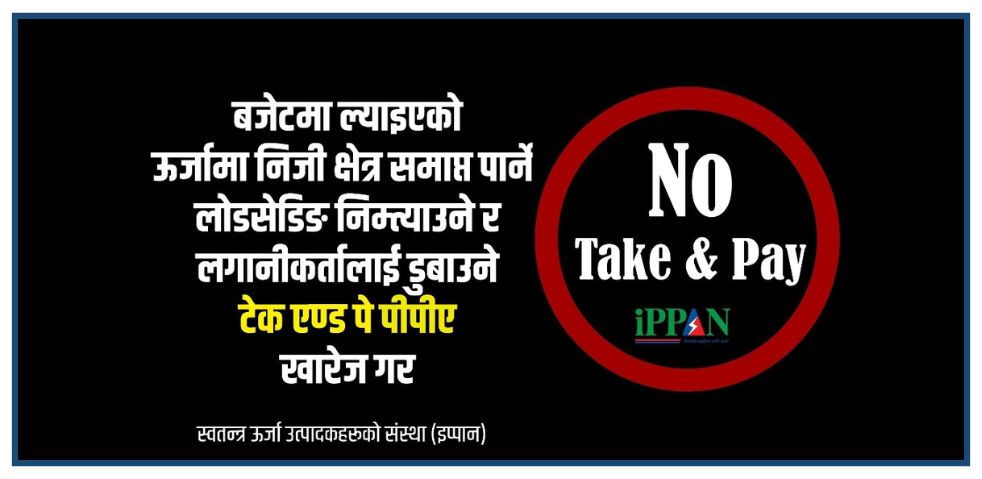
Private energy entrepreneurs in Nepal have taken to social media, protesting the government’s decision to introduce the ‘Take and Pay’ (Liu Ra Tir) system for electricity purchase agreements (PPA) in the new fiscal year budget.
Under this system, the government would only pay for the electricity it uses, instead of paying for the total electricity generated by hydropower projects. Entrepreneurs argue this move could severely hurt the private sector, discourage investment, and push the country back toward power shortages.
Online Campaign Targets Top Officials
Energy producers are now directly appealing to key government figures. They have publicly tagged Prime Minister Pushpa Kamal Dahal, Finance Minister Barshaman Pun, Energy Minister Shakti Bahadur Basnet, and NEA Executive Director Kulman Ghising on social media, urging them to withdraw the Take and Pay provision.
This digital campaign comes just days after developers handed over a memorandum to the Prime Minister and bombarded top officials with hundreds of SMS messages requesting the same.
Why Are Entrepreneurs Worried?
Entrepreneurs claim that this decision will:
- Weaken the private sector’s role in the energy industry
- Risk the return of load-shedding (power cuts)
- Causes financial losses to investors
- Damage the overall economy
The Independent Power Producers’ Association of Nepal (IPPAN) has strongly opposed the provision. According to IPPAN’s Vice President and protest coordinator Mohan Kumar Dangi, the policy shift will discourage private hydropower development, especially for Run-of-River (RoR) projects, which are most affected by the new model.
Ongoing Protests and Next Steps
Since Asar 6, private power developers have been staging a phase-wise protest. On the third day of their movement, they moved their campaign to social media to raise public awareness and pressure the government.
Dangi warned that if the government ignores these peaceful efforts, the protests will escalate. Planned steps include:
- Lobbying political party leaders in Parliament
- Launching a nationwide street protest
- Returning the keys of privately built hydropower projects to the government — a symbolic act of handing over control
Background: The Budget Controversy
The controversy started when the budget for FY 2082/83 (announced on Jestha 15) stated that all future PPAs for RoR hydropower projects would be done under the Take and Pay model only. This was a major change from the previous Take or Pay model, where producers were paid even if electricity wasn’t consumed, offering more security for private investors.
Conclusion
The ‘Take and Pay’ decision has sparked serious concerns across Nepal’s private energy sector. Developers fear this could lead to a slowdown in future hydropower investments, and possibly, a return to unstable electricity supply. With pressure mounting both online and offline, the government’s next move will be critical for the future of Nepal’s energy landscape.
-
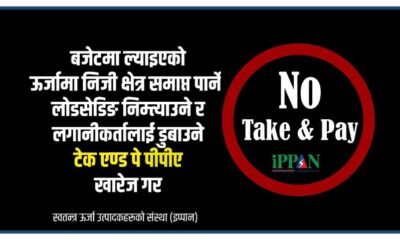
 Blogs3 days ago
Blogs3 days agoPrivate Power Producers Protest ‘Take and Pay’ Provision in Budget
-
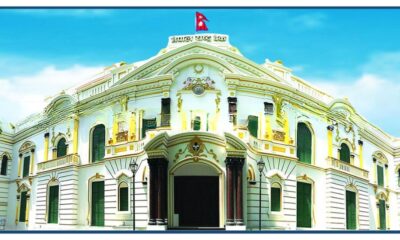
 Blogs3 days ago
Blogs3 days agoNepal Rastra Bank to Withdraw NPR 60 Billion from the Banking System on Monday
-
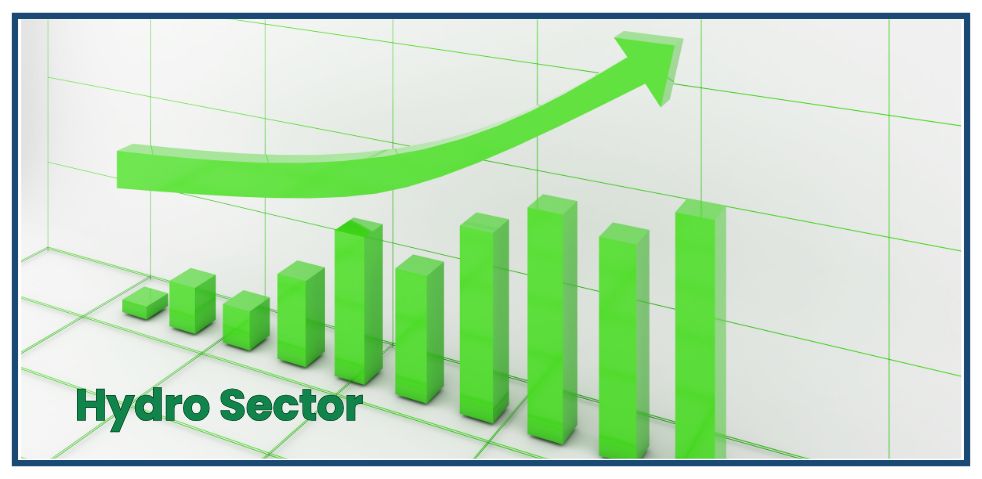
 Blogs6 days ago
Blogs6 days agoHydropower Gains 7.8% in One Month, Outperforming All Sectors
-

 Blogs1 year ago
Blogs1 year agoList of Stock Brokers in Nepal with NEPSE TMS Login – Updated
-
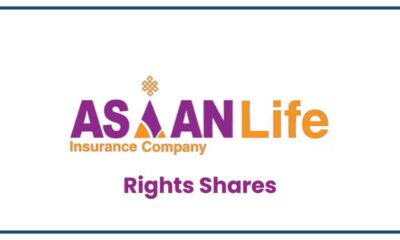
 Blogs3 days ago
Blogs3 days agoAsian Life Insurance to Issue Rights Shares from Asar 25
-

 Blogs3 months ago
Blogs3 months agoPure Energy IPO For General Public
-

 Blogs3 days ago
Blogs3 days ago52-Week Low & High Microfinance Shares in Nepal: Current Status and Future Outlook
-
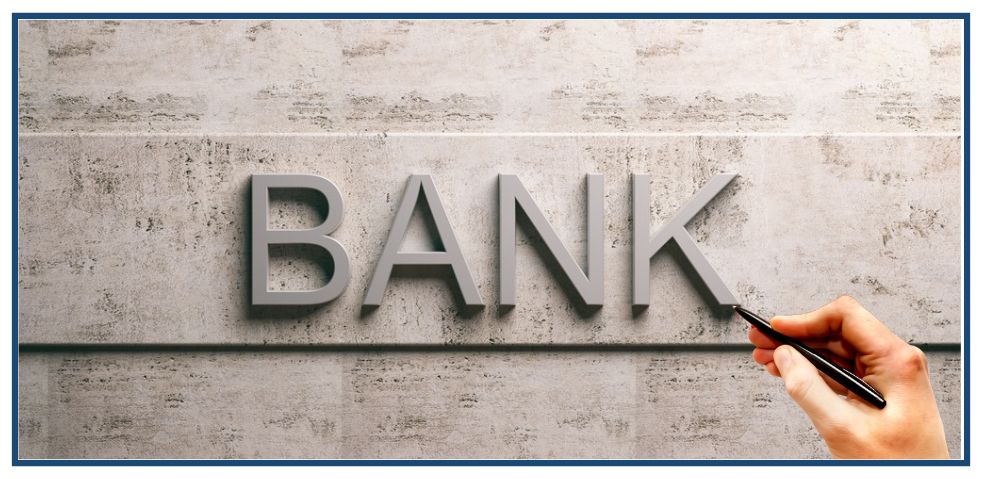
 Blogs1 week ago
Blogs1 week agoBanks Invest Rs. 16.45 Trillion in Directed Loans, 14% in Agriculture Sector | Says Nepal Rastra Bank




